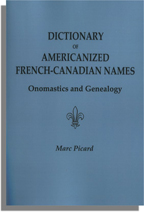 Let me start with a simplified, and probably more than you will ever need, introduction to Dictionary of Americanized French-Canadian Names: Onomastics and Genealogy. In short, surnames of 17th and 18th century colonists have changed over 400 years. This dictionary provides a brief, yet thorough, explanation of these linguistic changes along with a substantial list of surnames with their meaning and/or origin. Entries also provide some or all of the following information: the name of the first French-Canadian bearer of the name, the name of his parents, his place of origin in France, the name of his spouse and the names of her parents, and the place of his marriage.
Let me start with a simplified, and probably more than you will ever need, introduction to Dictionary of Americanized French-Canadian Names: Onomastics and Genealogy. In short, surnames of 17th and 18th century colonists have changed over 400 years. This dictionary provides a brief, yet thorough, explanation of these linguistic changes along with a substantial list of surnames with their meaning and/or origin. Entries also provide some or all of the following information: the name of the first French-Canadian bearer of the name, the name of his parents, his place of origin in France, the name of his spouse and the names of her parents, and the place of his marriage.
That synopsis should just about cover it for most people, but for those who like big words, here is the advanced version, in the words of the author:
“Some 400 years later, it should come as no surprise to find that important differences, both linguistic and distributional, have developed between the surnames found in France and those of its erstwhile colony. Indeed, there are enough such differences to make francophone onomastic research in North America a field of study unto itself, one that, surprisingly, has received very little serious attention when one considers how much time and effort have been invested in the genealogical study of these names.”
The author goes on to explain the division, or categorization, of ‘Canadian French’ surnames, along with subdivisions and types. The subsequent 12 pages go into detail about how and why names change. Coverage include topis like orthographical changes and phonological changes. There is also coverage for foreign names; English, German, Basque and Breton names and others; which are found in the same area of Canada. The discussion also covers French-Canadian surname modifications in English Canada and the US, with coverage on types of anglicization, direct translations, partial translations, near translations, and mistranslations.
So why would you want this book? The names. Remember, most of this book serves as a dictionary of names. Here is a sample entry taken from the author’s own ancestry, showing the value of common entries in this book:
“Picard, from Picard, the nickname of a native of Picardie, a former province in France. — Amer. Peacor, Pecor, Pecore.
— Philippe Destroismaison dit Picard (Adrien and Antionete Lerous) from Montreuil in Pasde-Calais (Nord-Pas-de-Calais) m. Maritine Crosnier (Pierre and Jeanne Rotreau) in Chateau-Richer, QC in 1669.”
Let me go back to simple. Many surnames have changed with time and this dictionary will help trace your ancestor’s names through history.
Get your copy of Dictionary of Americanized French-Canadian Names: Onomastics and Genealogy from Family Roots Publishing; Price: 21.51
I just received my copy today. It seems pretty good. For my surname it says that we came from Brittany (Bretagne), which is correct. However, it states that our name is from a place in France called Pellan; it is more likely that our name is from la Pointe de Pen Lan, since early records spell our name as Penlan and Pènelan and our ancestor came from nearby Péaule. Additionally, it says that Pellant is an Americanized version, but this spelling if found in many French-language records in Canada and is just as French as Pelland. There is no mention of the variations Pellen and Pellard, which developed in Michigan and Washington, nor of the Balois or Balise families of Massachusetts, who were once Pellands.
I did find many of the anglicizations with which I am familiar, but noticed some names that are missing such as: Gagnier-Gardner, Gadoury-Gadrow, LeSieur-Sawyer,Fagnant-Fanyou, Desnoyers-Warner, Pariseau-Parazoo and Limoges-LaMorge.
Overall, I think this is an interesting look at where names come from and how names change and this could certainly be an invaluable resource especially for those without a working knowledge of both French and English.
Jean-Richard Pelland http://www.pelland.org